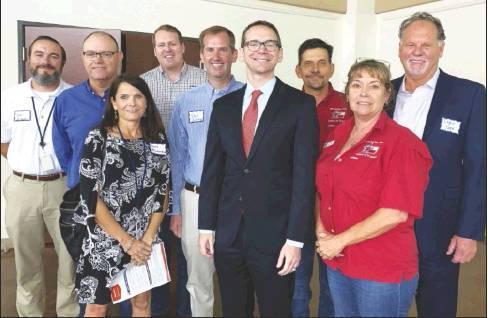State of education in Texas
Changes are coming to public education in Texas, and Mike Morath, Commissioner of Education for the State of Texas, spoke to the Wimberley Valley Chamber of Commerce last week to outline the plans for the future.
The talk largely centered on the passage of House Bill 3, which is legislation recently passed by the Texas Legislature to reform public schools.
The biggest change in the funding mechanism for Wimberley was the reduction of Chapter 41, which is often referred to as Robin Hood. Chapter 41 takes a portion of funds from wealthier school districts that aren’t growing at a particularly fast rate and gives it to poorer school districts in order to construct necessary facilities. The change had a large impact for Wimberley by allowing the school district to keep more money locally.
“We are at the point right now where we actually, for the first time that I know of, we are literally in the black,” Wimberley ISD Superintendent Dwain York said. “Chapter 41 was cut. We will check our numbers for the seventh time just to make sure. It is almost like ‘Someone pinch me, because I’m dreaming.’ The change has helped us on the financial side.”
The new law also lowers property taxes that go towards school funding, but it is not known yet exactly how much that will impact properties in Hays County. The state estimates that the average drop will be eight cents per $100 of property value.
The bill also increased the minimum salary schedule for teachers as well as created a new set of incentives for successful teachers. York said that the current models offered by the state for how to implement the new incentives are for larger school districts and under-performing school districts, so Wimberley will have to come up with it’s own way to implement the plans.
While the bill was largely talked about as a change in school financing from the state level, it also had broad implications for how and what schools will focus on. Getting children ready for their education early is a large part of the equation.
“We do an entry level diagnostic for every child entering kindergarten,” Mike Morath, Commissioner of Education for the State of Texas, said. “Are you ready for basic lessons and literacy in kindergarten? The truth is less than half of five year olds are ready for kindergarten... If half of our kids are behind when they start at the starting line, how difficult is that work for our teachers?... When you have a system that requires (a teacher) to squeeze a year and three months out of your kids every year for four years in a row to catch up… imagine how difficult that is. All we expect from our teachers in this system is perfection and any system that requires perfection is not going to work well for our kids.”
To help the situation, the bill now requires full day Pre-K.
School boards will have to adopt elementary literacy and mathematics literacy plans, as well as formal goals for where all their students need to be by the end of third grade.
There are also other requirements like a dual language program and many other implications at the junior high and high school level like focusing on teaching academic skills through career and tech opportunities or offering courses with college credits. School boards will have to adapt formal plans on college, career and military readiness.
“There are a large amount of implementation challenges that face school districts with the new bill,” Morath said. “These are good challenges to have but it is a lot of change... We will go through a progress monitoring process to see throughout the course of each year how those goals are being met or not met.”
Morath also said that Wimberley ISD and the Wimberley community are doing a good job in public education.
“There are very high levels of student achievement in the Wimberley school system,” Morath said. “It is a great school system. Anecdotally, you’ve got significant levels of engagement from the community here, from the chamber, as well as parents and a very active PTA. It would be a great place to live.”
While there are a lot of changes required by the new law, York said that Wimberley is uniquely positioned to take on the challenge. In fact, in many areas Wimberley has already implemented the new requirements.
“We are one of the very few school districts in Central Texas that employs intervention teachers in reading and math at the third and fifth grade levels,” York said. “Kids that are struggling, we get them extra time in reading and math. We started funding full day Pre-K well before the state helped us fund it… I think that we have been ahead of the curve, I really do. When the state began requiring four years of math and science at the high school level, we had been doing that for two or three years before it was mandated. I think that us as a school district have stayed ahead of these academic goals. Our career and tech is amazing for a school our size with things like health science, engineering, welding and business among others. We’ve been doing duel credit and working Austin Community College to get students college hours before they graduate high school. I really think we have been very proactive.”
To find out more information about HB3, visit tea.texas.gov/hb3.


